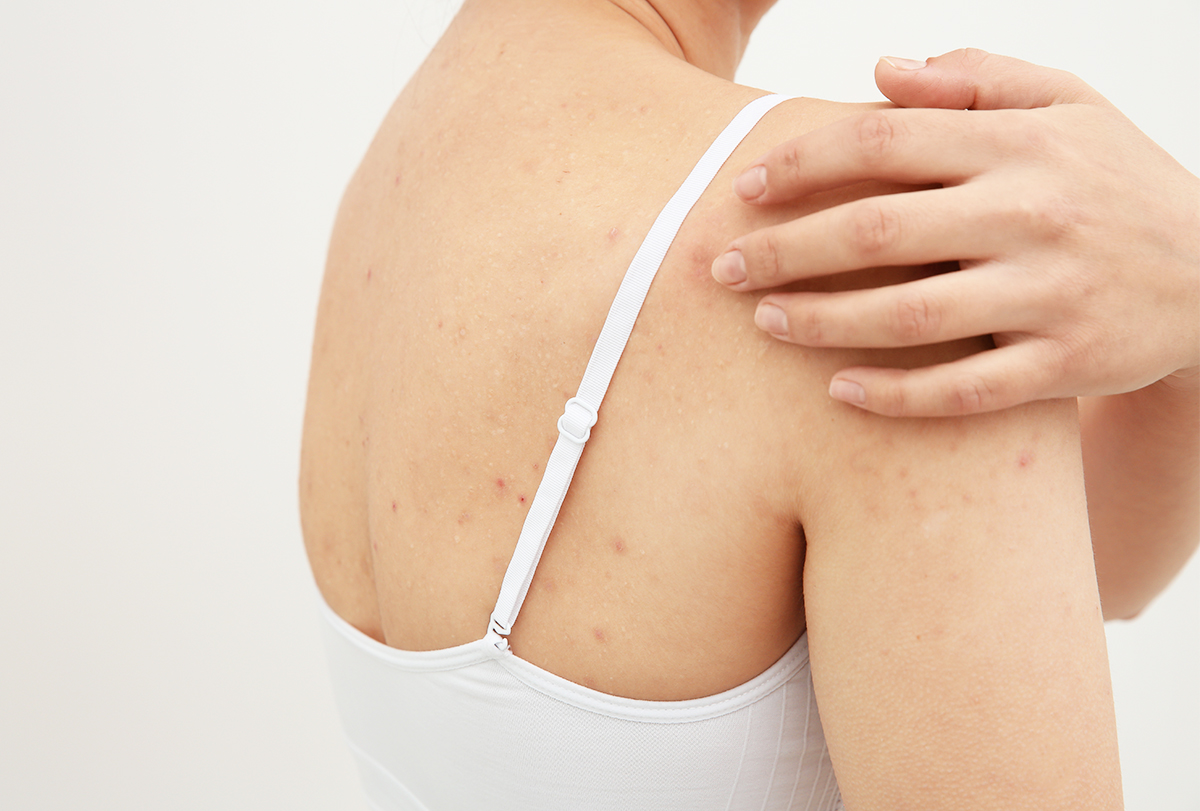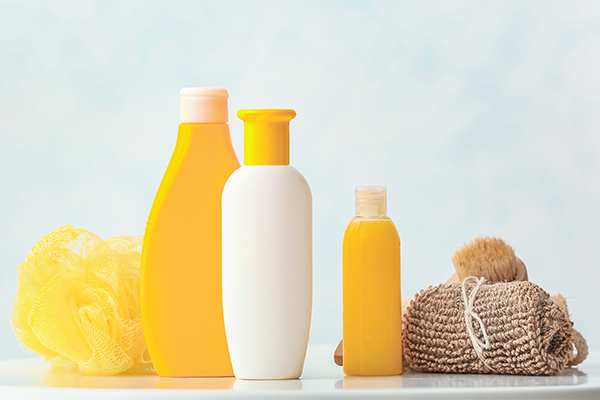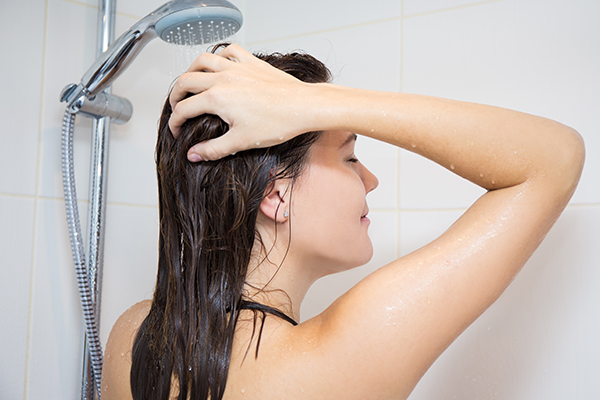In this article:
When speaking of acne, people often picture red, inflamed pimples on the face. However, acne can also develop on the back, as this body part has a high number of oil glands and sweat glands that can easily get clogged.

In fact, back acne is a very common skin condition affecting a high number of people in the United States.
Home Remedies for Back Acne
Several natural ingredients and at-home remedies can help you manage mild to moderate back acne. For severe acne, consult your doctor.
Caution: Make sure to conduct a patch test before using any remedy to check for allergic or sensitivity reactions.

1. Apply turmeric
Turmeric contains antibacterial compounds known as curcumin. (1)
How to use:
- Simply prepare a paste of yogurt and turmeric, and apply the paste to the affected areas.
- You can also use turmeric-based natural face masks.
2. Try green tea
Green tea is rich in polyphenols known as epigallocatechins, which help treat non-inflammatory acne lesions, such as blackheads and whiteheads. (2)
How to use:
- Brew a cup of green tea and mix it with a cup of water. Apply the solution to the affected areas using a cotton ball, and wash it off with cold water after 10 minutes.
- Alternatively, you can use 2% green tea extract containing lotions, two times a day, to help control the acne.
Over-the-Counter Products to Manage Back Acne

The following OTCs can help manage back acne.
Caution: Make sure that you use OTCs only if you have a small number of acne lesions that mostly are not any more painful than pus-filled pimples.
- Benzoyl peroxide foam cleansers: It is recommended to use 5% concentration benzoyl peroxide cleansers to wash your back to manage acne flares. Make sure to rinse the product off properly as otherwise, it can bleach your clothes.
- Body washes or shower gels: The use of body cleansers containing salicylic acid, resorcinol, and sulfur can help in the management of acne, blackheads, and whiteheads. You can also use acne cleansers containing neem oil, tea tree oil, menthol, grapefruit seed extracts, licorice root extracts, alpha-lipoic acid, (3)(4) alpha hydroxy acids, and 2% glycolic acid. Similarly, you can use medicated body sprays in place of body washes.
- Cleansing wipes or pads: Cleansing wipes or pads are similar to medicated body washes and can be used for a localized area or for a quick cleanse.
- Medicated pimple patches: You can find hydrocolloid stickers that contain salicylic acid, which, when applied over the pimples, can treat them effectively.
- Lotion applicator for the back: Since it can be difficult to reach your back to apply products, you can invest in a lotion applicator. This long device with a curved handle helps apply sunscreens, moisturizers, and DIY products to the hard-to-reach areas on your back without putting a strain on your muscles. It is recommended to use applicators that are waterproof to prevent mold growth.
Self-Care Measures
In addition to treating your acne, it is vital to take proper care of your skin to promote skin healing and prevent acne flare-ups in the future. Here are some self-care measures to improve your skin health:
1. Maintain good hygiene

Make sure to shower after exercising to prevent bacterial growth. Rinse your back properly after you shampoo or condition your hair as the residue can clog your skin pores.
2. Avoid harsh soaps
Harsh soaps can disturb the skin pH and worsen the acne. Instead, use soaps with a 5.5 pH. In addition, refrain from using astringents, antibacterial soaps, abrasive scrubs, back brushes, loofahs, and buff puffs on your acne-affected skin.
3. Wear loose clothes and avoid friction
Use loose-fitting clothes made of cotton, especially when working out. It is also vital to avoid friction on your back from backpacks, shoulder pads, or gears as the irritation can flare up the acne.
4. Do not pick at your acne
Popping, squeezing, or picking at your acne not only irritates the skin but also promotes the spread of infection.
5. Wash your clothes properly
Always wear clean clothes to help manage your acne and prevent it from worsening. Make sure to change and wash your pillowcases and bedsheets at least twice a week to remove the bacteria and dead skin cells. Use fragrance-free detergents to wash your clothes and bedding.
6. Improve your diet

Consuming immunity-boosting foods such as those high in vitamin C (such as lemon and kiwi), omega-3 fatty acids (such as salmon, avocado, black cod, and walnuts), and vitamin A (such as apricots and sweet potatoes) can help fight acne-causing bacteria.
In addition, eat foods such as spinach, wheat germ, whole grain, and pumpkin seeds, which are rich in zinc. However, avoid sugary, oily foods that can cause inflammation and acne flare-ups. (5)
7. Stay hydrated
Consume plenty of water and water-rich foods throughout the day to prevent skin dryness and therefore acne flare-ups.
8. Manage stress
An increase in stress levels can worsen acne breakouts. (6) Therefore, stress management techniques such as yoga, meditation, and exercise can help in acne management.
Final Word
Take proper care of your skin and religiously follow your treatment regimen to treat your acne. The quicker the acne is treated, the better. You can use home remedies as adjuncts to the medical treatment.
If your acne becomes severe and painful, it is best to consult your doctor for proper medical treatment.

- Was this article helpful?
- YES, THANKS!NOT REALLY


